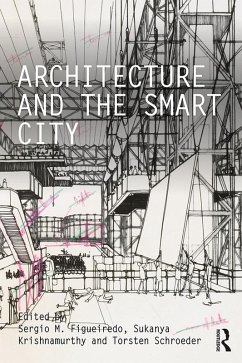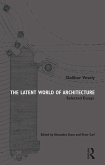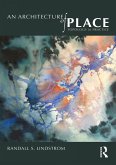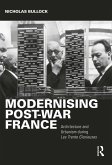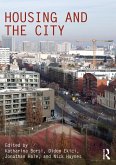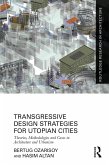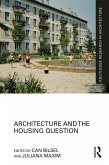Architecture and the Smart City (eBook, ePUB)
Redaktion: Figueiredo, Sergio M.; Schroeder, Torsten; Krishnamurthy, Sukanya
47,95 €
47,95 €
inkl. MwSt.
Sofort per Download lieferbar

24 °P sammeln
47,95 €
Als Download kaufen

47,95 €
inkl. MwSt.
Sofort per Download lieferbar

24 °P sammeln
Jetzt verschenken
Alle Infos zum eBook verschenken
47,95 €
inkl. MwSt.
Sofort per Download lieferbar
Alle Infos zum eBook verschenken

24 °P sammeln
Architecture and the Smart City (eBook, ePUB)
Redaktion: Figueiredo, Sergio M.; Schroeder, Torsten; Krishnamurthy, Sukanya
- Format: ePub
- Merkliste
- Auf die Merkliste
- Bewerten Bewerten
- Teilen
- Produkt teilen
- Produkterinnerung
- Produkterinnerung

Bitte loggen Sie sich zunächst in Ihr Kundenkonto ein oder registrieren Sie sich bei
bücher.de, um das eBook-Abo tolino select nutzen zu können.
Hier können Sie sich einloggen
Hier können Sie sich einloggen
Sie sind bereits eingeloggt. Klicken Sie auf 2. tolino select Abo, um fortzufahren.

Bitte loggen Sie sich zunächst in Ihr Kundenkonto ein oder registrieren Sie sich bei bücher.de, um das eBook-Abo tolino select nutzen zu können.
The book tackles questions related to the future of architecture and urbanism, lessons learned from global case studies, challenges related to interdisciplinary research, and critically examines what the future of buildings and cities will look like.
- Geräte: eReader
- ohne Kopierschutz
- eBook Hilfe
- Größe: 7.92MB
Andere Kunden interessierten sich auch für
![The Latent World of Architecture (eBook, ePUB) The Latent World of Architecture (eBook, ePUB)]() Dalibor VeselyThe Latent World of Architecture (eBook, ePUB)38,95 €
Dalibor VeselyThe Latent World of Architecture (eBook, ePUB)38,95 €![An Architecture of Place (eBook, ePUB) An Architecture of Place (eBook, ePUB)]() Randall S. LindstromAn Architecture of Place (eBook, ePUB)40,95 €
Randall S. LindstromAn Architecture of Place (eBook, ePUB)40,95 €![Modernising Post-war France (eBook, ePUB) Modernising Post-war France (eBook, ePUB)]() Nicholas BullockModernising Post-war France (eBook, ePUB)37,95 €
Nicholas BullockModernising Post-war France (eBook, ePUB)37,95 €![Housing and the City (eBook, ePUB) Housing and the City (eBook, ePUB)]() Housing and the City (eBook, ePUB)38,95 €
Housing and the City (eBook, ePUB)38,95 €![Transgressive Design Strategies for Utopian Cities (eBook, ePUB) Transgressive Design Strategies for Utopian Cities (eBook, ePUB)]() Bertug OzarisoyTransgressive Design Strategies for Utopian Cities (eBook, ePUB)41,95 €
Bertug OzarisoyTransgressive Design Strategies for Utopian Cities (eBook, ePUB)41,95 €![Architecture and the Housing Question (eBook, ePUB) Architecture and the Housing Question (eBook, ePUB)]() Architecture and the Housing Question (eBook, ePUB)43,95 €
Architecture and the Housing Question (eBook, ePUB)43,95 €![Visual Spatial Enquiry (eBook, ePUB) Visual Spatial Enquiry (eBook, ePUB)]() Visual Spatial Enquiry (eBook, ePUB)41,95 €
Visual Spatial Enquiry (eBook, ePUB)41,95 €-
-
-
The book tackles questions related to the future of architecture and urbanism, lessons learned from global case studies, challenges related to interdisciplinary research, and critically examines what the future of buildings and cities will look like.
Dieser Download kann aus rechtlichen Gründen nur mit Rechnungsadresse in A, B, BG, CY, CZ, D, DK, EW, E, FIN, F, GR, HR, H, IRL, I, LT, L, LR, M, NL, PL, P, R, S, SLO, SK ausgeliefert werden.
Produktdetails
- Produktdetails
- Verlag: Taylor & Francis
- Seitenzahl: 280
- Erscheinungstermin: 18. Oktober 2019
- Englisch
- ISBN-13: 9781000706710
- Artikelnr.: 57932252
- Verlag: Taylor & Francis
- Seitenzahl: 280
- Erscheinungstermin: 18. Oktober 2019
- Englisch
- ISBN-13: 9781000706710
- Artikelnr.: 57932252
- Herstellerkennzeichnung Die Herstellerinformationen sind derzeit nicht verfügbar.
Sergio M. Figueiredo is an architect, author, curator and historian. He is currently an Assistant Professor of Architecture History and Theory at TU Eindhoven, where he also heads the Curatorial Research Collective (CRC), a fledgling curatorial and research group. Previously, as a Fulbright scholar, he completed a doctoral dissertation at UCLA while also being appointed Senior Lecturer of Architecture History and Theory at OTIS College for Art and Design. He has contributed to several publications, ranging from refereed articles on Places and ARQ, to op-eds on DomusWeb and articles in Volume, as well as guest-editing an OASE special issue on architecture museums. His first book, The NAi Effect: Creating Architecture Culture, was published in 2016 by nai010. Sukanya Krishnamurthy is a Chancellor's Fellow/Senior Lecturer at the School of Geosciences, University of Edinburgh. Her focus lies at the interface between urban and social geography, where her scholarship analyses how cities can use their resources and values for better sustainable development. Key interests include place-making and participatory approaches, urban cultures and representation, society and smart urbanism. Over the last few years she has bought these interests together within child-friendly planning, participatory processes within Living Labs, urban development and management of informal areas, and enabling agendas of context driven planning. She serves as a board member on various civic society associations (Apolitical, Play Scotland) and is also a member of Dutch and EU research evaluation commissions. She has been a PI and team member on research projects (EU, NWO, third-sector funding) in the Netherlands, Germany, Canada, Israel, UK, Turkey and India. Torsten Schroeder is an architect, researcher and design advisor. Currently he is Assistant Professor of Sustainability in Architectural Design at TU Eindhoven. His key research interests are sustainability, resilience and circular economy within architecture and cities and he focusses on translating these three concepts into comprehensive design projects. Torsten co-founded and co-directs the Archi Lab, a university-based architectural and urban think tank dedicated to exploring, creating and developing future concepts and scenarios. He obtained his PhD in the Cities Programme at the London School of Economics and Political Science, winning the prestigious RIBA PhD research award in 2015. Torsten offers a unique blend of practical and research expertise. He has more than ten years of experience in designing and realising a wide range of outstanding architectural projects for leading design practices, amongst others for Rem Koolhaas/Office for Metropolitan Architecture as architect and project leader on projects in the USA, Germany, South Korea and China.
1. Introduction: A Brave New World Sergio M. Figueiredo, Sukanya
Krishnamurthy, Torsten Schroeder Section: Histories and Futures 2.
Frictionless Futures: The Vision of Smartness and the Occlusion of
Alternatives Nick Dunn, Paul Cureton (Lancaster University, United Kingdom)
3. Is the city becoming computable? Antoine Picon and Thomas Shay Hill
(Harvard University, United States) 4. The Answer is "Smart" - But what was
the Question? Oliver Schürer (Vienna University of Technology, Austria) 5.
The Trouble with Capitalist Utopia: A totalizing scheme of subsumption and
planetary urbanization Angel Callander (Humboldt-Universität zu Berlin,
Germany) 6. The Metaphor of the City as a Thinking Machine. A Complicated
Relationship and its Backstory Sonja Hnilica (TU Dortmund, Germany)
Section: Agency and Control 7. Hyperwwwork: Is Alexa our new Chief
Happiness Officer? IoT and the Logics of Soft-Production Romain Curnier,
Adrien Grigorescu (ENSA Paris Malaquais, France) 8. Soft Sibylations: GPS
Navigation as Urban Speculation Benjamin W. Tippin (Torrance Art Museum,
United States) 9. Intelligence and Armament Kevin Rogan (The New School -
Parsons School of Design, United States) 10. The Right to the (Smart) City,
Participation and Open Data Jonas Breuer, Nils Walravens, Shenja Van der
Graaf, Ilse Marien (imec-SMIT, Vrije Universiteit Brussel, Belgium) 11.
Scenarios of Interactive Citizenship Renata Tyszczuk (University of
Sheffield, United Kingdom) Section: Materialities and Spaces 12. The IdIoT
in the SMART Home Delfina Fantini van Ditmar (Royal College of Art, United
Kingdom) 13. Five Strategies of Socially Smart Cities Geeta Mehta (Columbia
University, United States), Shreya Malu, Merlyn Mathew (Asia Initiatives,
New York, United States) 14. Politics of sensing and listening Dietmar
Offenhuber (Northeastern University, United States), Sam Auinger
(Independent Sound artist) 15. Recoupling Soft and Hard: Engaging Data as
an Immaterial Practice Maya Przybylski (University of Waterloo, Canada)
16. Moving in the Metropolis: Smart City Solutions and the Urban Everyday
Experience Sanna Lehtinen, Vesa Vihanninjoki (University of Helsinki,
Finland) Section: Networks and Nodes 17. Standing Out in a Crowd: Big Data
to Produce New Forms of Publicness Silvio Carta, Rebecca Onafuye
(University of Hertfordshire, United Kingdom), Pieter de Kock (University
of Lincoln, United Kingdom) 18. Operationalizing Smartness: Towards a
Transdisciplinary Framework to Urban Agency Shin Alexandre Koseki (École
Polytechnique Fédérale de Lausanne, Switzerland) 19. New Sensorial Vehicles
- Navigating Critical Understandings of Autonomous Futures Fiona McDermott
(Trinity College Dublin, Ireland) Index
Krishnamurthy, Torsten Schroeder Section: Histories and Futures 2.
Frictionless Futures: The Vision of Smartness and the Occlusion of
Alternatives Nick Dunn, Paul Cureton (Lancaster University, United Kingdom)
3. Is the city becoming computable? Antoine Picon and Thomas Shay Hill
(Harvard University, United States) 4. The Answer is "Smart" - But what was
the Question? Oliver Schürer (Vienna University of Technology, Austria) 5.
The Trouble with Capitalist Utopia: A totalizing scheme of subsumption and
planetary urbanization Angel Callander (Humboldt-Universität zu Berlin,
Germany) 6. The Metaphor of the City as a Thinking Machine. A Complicated
Relationship and its Backstory Sonja Hnilica (TU Dortmund, Germany)
Section: Agency and Control 7. Hyperwwwork: Is Alexa our new Chief
Happiness Officer? IoT and the Logics of Soft-Production Romain Curnier,
Adrien Grigorescu (ENSA Paris Malaquais, France) 8. Soft Sibylations: GPS
Navigation as Urban Speculation Benjamin W. Tippin (Torrance Art Museum,
United States) 9. Intelligence and Armament Kevin Rogan (The New School -
Parsons School of Design, United States) 10. The Right to the (Smart) City,
Participation and Open Data Jonas Breuer, Nils Walravens, Shenja Van der
Graaf, Ilse Marien (imec-SMIT, Vrije Universiteit Brussel, Belgium) 11.
Scenarios of Interactive Citizenship Renata Tyszczuk (University of
Sheffield, United Kingdom) Section: Materialities and Spaces 12. The IdIoT
in the SMART Home Delfina Fantini van Ditmar (Royal College of Art, United
Kingdom) 13. Five Strategies of Socially Smart Cities Geeta Mehta (Columbia
University, United States), Shreya Malu, Merlyn Mathew (Asia Initiatives,
New York, United States) 14. Politics of sensing and listening Dietmar
Offenhuber (Northeastern University, United States), Sam Auinger
(Independent Sound artist) 15. Recoupling Soft and Hard: Engaging Data as
an Immaterial Practice Maya Przybylski (University of Waterloo, Canada)
16. Moving in the Metropolis: Smart City Solutions and the Urban Everyday
Experience Sanna Lehtinen, Vesa Vihanninjoki (University of Helsinki,
Finland) Section: Networks and Nodes 17. Standing Out in a Crowd: Big Data
to Produce New Forms of Publicness Silvio Carta, Rebecca Onafuye
(University of Hertfordshire, United Kingdom), Pieter de Kock (University
of Lincoln, United Kingdom) 18. Operationalizing Smartness: Towards a
Transdisciplinary Framework to Urban Agency Shin Alexandre Koseki (École
Polytechnique Fédérale de Lausanne, Switzerland) 19. New Sensorial Vehicles
- Navigating Critical Understandings of Autonomous Futures Fiona McDermott
(Trinity College Dublin, Ireland) Index
1. Introduction: A Brave New World Sergio M. Figueiredo, Sukanya
Krishnamurthy, Torsten Schroeder Section: Histories and Futures 2.
Frictionless Futures: The Vision of Smartness and the Occlusion of
Alternatives Nick Dunn, Paul Cureton (Lancaster University, United Kingdom)
3. Is the city becoming computable? Antoine Picon and Thomas Shay Hill
(Harvard University, United States) 4. The Answer is "Smart" - But what was
the Question? Oliver Schürer (Vienna University of Technology, Austria) 5.
The Trouble with Capitalist Utopia: A totalizing scheme of subsumption and
planetary urbanization Angel Callander (Humboldt-Universität zu Berlin,
Germany) 6. The Metaphor of the City as a Thinking Machine. A Complicated
Relationship and its Backstory Sonja Hnilica (TU Dortmund, Germany)
Section: Agency and Control 7. Hyperwwwork: Is Alexa our new Chief
Happiness Officer? IoT and the Logics of Soft-Production Romain Curnier,
Adrien Grigorescu (ENSA Paris Malaquais, France) 8. Soft Sibylations: GPS
Navigation as Urban Speculation Benjamin W. Tippin (Torrance Art Museum,
United States) 9. Intelligence and Armament Kevin Rogan (The New School -
Parsons School of Design, United States) 10. The Right to the (Smart) City,
Participation and Open Data Jonas Breuer, Nils Walravens, Shenja Van der
Graaf, Ilse Marien (imec-SMIT, Vrije Universiteit Brussel, Belgium) 11.
Scenarios of Interactive Citizenship Renata Tyszczuk (University of
Sheffield, United Kingdom) Section: Materialities and Spaces 12. The IdIoT
in the SMART Home Delfina Fantini van Ditmar (Royal College of Art, United
Kingdom) 13. Five Strategies of Socially Smart Cities Geeta Mehta (Columbia
University, United States), Shreya Malu, Merlyn Mathew (Asia Initiatives,
New York, United States) 14. Politics of sensing and listening Dietmar
Offenhuber (Northeastern University, United States), Sam Auinger
(Independent Sound artist) 15. Recoupling Soft and Hard: Engaging Data as
an Immaterial Practice Maya Przybylski (University of Waterloo, Canada)
16. Moving in the Metropolis: Smart City Solutions and the Urban Everyday
Experience Sanna Lehtinen, Vesa Vihanninjoki (University of Helsinki,
Finland) Section: Networks and Nodes 17. Standing Out in a Crowd: Big Data
to Produce New Forms of Publicness Silvio Carta, Rebecca Onafuye
(University of Hertfordshire, United Kingdom), Pieter de Kock (University
of Lincoln, United Kingdom) 18. Operationalizing Smartness: Towards a
Transdisciplinary Framework to Urban Agency Shin Alexandre Koseki (École
Polytechnique Fédérale de Lausanne, Switzerland) 19. New Sensorial Vehicles
- Navigating Critical Understandings of Autonomous Futures Fiona McDermott
(Trinity College Dublin, Ireland) Index
Krishnamurthy, Torsten Schroeder Section: Histories and Futures 2.
Frictionless Futures: The Vision of Smartness and the Occlusion of
Alternatives Nick Dunn, Paul Cureton (Lancaster University, United Kingdom)
3. Is the city becoming computable? Antoine Picon and Thomas Shay Hill
(Harvard University, United States) 4. The Answer is "Smart" - But what was
the Question? Oliver Schürer (Vienna University of Technology, Austria) 5.
The Trouble with Capitalist Utopia: A totalizing scheme of subsumption and
planetary urbanization Angel Callander (Humboldt-Universität zu Berlin,
Germany) 6. The Metaphor of the City as a Thinking Machine. A Complicated
Relationship and its Backstory Sonja Hnilica (TU Dortmund, Germany)
Section: Agency and Control 7. Hyperwwwork: Is Alexa our new Chief
Happiness Officer? IoT and the Logics of Soft-Production Romain Curnier,
Adrien Grigorescu (ENSA Paris Malaquais, France) 8. Soft Sibylations: GPS
Navigation as Urban Speculation Benjamin W. Tippin (Torrance Art Museum,
United States) 9. Intelligence and Armament Kevin Rogan (The New School -
Parsons School of Design, United States) 10. The Right to the (Smart) City,
Participation and Open Data Jonas Breuer, Nils Walravens, Shenja Van der
Graaf, Ilse Marien (imec-SMIT, Vrije Universiteit Brussel, Belgium) 11.
Scenarios of Interactive Citizenship Renata Tyszczuk (University of
Sheffield, United Kingdom) Section: Materialities and Spaces 12. The IdIoT
in the SMART Home Delfina Fantini van Ditmar (Royal College of Art, United
Kingdom) 13. Five Strategies of Socially Smart Cities Geeta Mehta (Columbia
University, United States), Shreya Malu, Merlyn Mathew (Asia Initiatives,
New York, United States) 14. Politics of sensing and listening Dietmar
Offenhuber (Northeastern University, United States), Sam Auinger
(Independent Sound artist) 15. Recoupling Soft and Hard: Engaging Data as
an Immaterial Practice Maya Przybylski (University of Waterloo, Canada)
16. Moving in the Metropolis: Smart City Solutions and the Urban Everyday
Experience Sanna Lehtinen, Vesa Vihanninjoki (University of Helsinki,
Finland) Section: Networks and Nodes 17. Standing Out in a Crowd: Big Data
to Produce New Forms of Publicness Silvio Carta, Rebecca Onafuye
(University of Hertfordshire, United Kingdom), Pieter de Kock (University
of Lincoln, United Kingdom) 18. Operationalizing Smartness: Towards a
Transdisciplinary Framework to Urban Agency Shin Alexandre Koseki (École
Polytechnique Fédérale de Lausanne, Switzerland) 19. New Sensorial Vehicles
- Navigating Critical Understandings of Autonomous Futures Fiona McDermott
(Trinity College Dublin, Ireland) Index
